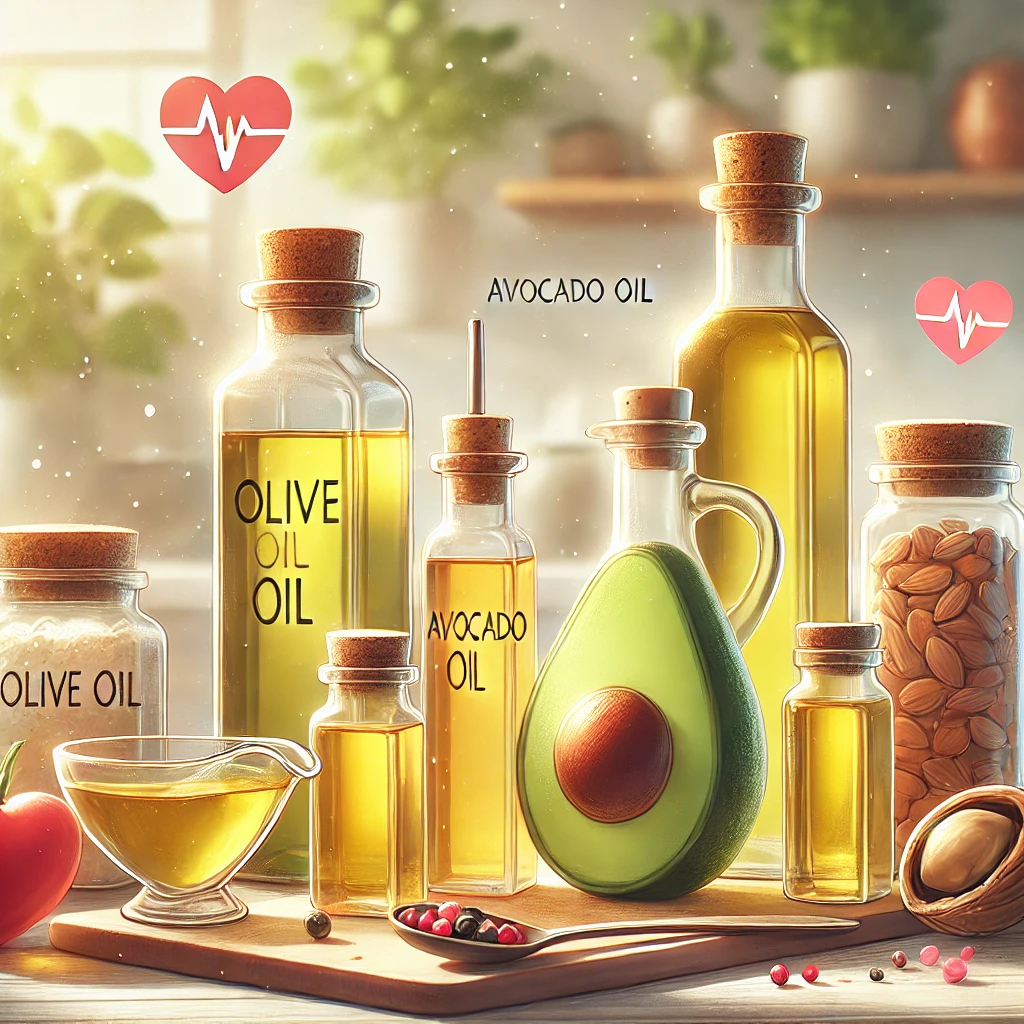Choosing the right cooking oil can make a significant difference for your heart health. Oils rich in unsaturated fats, antioxidants, and anti-inflammatory compounds support cardiovascular health, while oils high in saturated or trans fats can raise cholesterol and increase heart disease risk. Here are some of the best oils to include in your kitchen for a heart-friendly diet.
1. Extra Virgin Olive Oil
Extra virgin olive oil is widely known as one of the healthiest oils, largely due to its high levels of monounsaturated fats and antioxidants.
- Benefits: Contains oleic acid, which helps reduce inflammation and improve cholesterol levels. It’s also high in polyphenols, which have antioxidant properties.
- Best Uses: Ideal for salad dressings, light sautéing, and drizzling over cooked vegetables.
Tip: Extra virgin olive oil has a lower smoke point, so avoid using it for high-heat cooking.
2. Avocado Oil
Avocado oil has a high smoke point and is packed with monounsaturated fats, making it a versatile and heart-healthy option.
- Benefits: High in oleic acid, which supports heart health by reducing LDL (bad) cholesterol. Avocado oil is also rich in vitamin E, an antioxidant that supports overall wellness.
- Best Uses: Suitable for high-heat cooking, roasting, and grilling, as well as dressings and dips.
Tip: Its mild flavor makes avocado oil suitable for a variety of dishes without overpowering other flavors.
3. Canola Oil
Canola oil is low in saturated fats and high in omega-3 fatty acids, which support cardiovascular health.
- Benefits: Provides alpha-linolenic acid (ALA), a type of omega-3 that helps reduce inflammation and may lower the risk of heart disease.
- Best Uses: Good for baking, stir-frying, and sautéing.
Tip: Look for cold-pressed or minimally processed canola oil to retain its nutritional benefits.
4. Flaxseed Oil
Flaxseed oil is rich in omega-3 fatty acids, specifically ALA, making it beneficial for heart health. However, it is not suitable for cooking due to its low smoke point.
- Benefits: High in ALA, which supports heart health by reducing blood pressure and inflammation. It may also help lower cholesterol levels.
- Best Uses: Perfect for drizzling on salads, smoothies, or adding to dips.
Tip: Store flaxseed oil in the refrigerator, as it can go rancid quickly.
5. Walnut Oil
Walnut oil is another oil high in omega-3 fatty acids and is particularly rich in antioxidants.
- Benefits: Contains polyphenols and omega-3s, which help reduce inflammation and support heart health.
- Best Uses: Excellent for salad dressings or drizzling over finished dishes, but not suitable for high-heat cooking.
Tip: Walnut oil has a distinct nutty flavor that pairs well with vinaigrettes and roasted vegetables.
6. Sesame Oil
Sesame oil contains a balance of monounsaturated and polyunsaturated fats, along with antioxidants like sesamin and sesamol, which may benefit heart health.
- Benefits: Rich in antioxidants and anti-inflammatory compounds, helping support blood vessel health and reduce cholesterol levels.
- Best Uses: Works well in stir-fries, marinades, and Asian-inspired dishes.
Tip: Opt for light sesame oil for cooking and toasted sesame oil for finishing dishes, as it has a strong, nutty flavor.
7. Grapeseed Oil
Grapeseed oil is a good source of polyunsaturated fats, including omega-6 fatty acids, and has a neutral flavor, making it versatile for various recipes.
- Benefits: High in vitamin E and omega-6 fatty acids, which help reduce inflammation. However, balance with omega-3s is essential to avoid excessive omega-6 intake.
- Best Uses: Great for baking, sautéing, and as a base for salad dressings.
Tip: Choose cold-pressed grapeseed oil to preserve its nutrients.
Tips for Choosing and Using Heart-Healthy Oils
- Opt for Cold-Pressed Oils: Cold-pressed oils retain more nutrients and antioxidants, which can support heart health.
- Mind the Smoke Point: Each oil has a specific smoke point; overheating can cause oils to oxidize, producing harmful compounds.
- Store Properly: Keep oils in a cool, dark place to prevent them from going rancid. Refrigerate oils like flaxseed and walnut oil to maintain freshness.
Final Thoughts
Incorporating heart-healthy oils into your diet is a simple way to support cardiovascular health while enhancing the flavor of your meals. Choose oils high in unsaturated fats and antioxidants, and enjoy them in moderation as part of a balanced diet.
Share this content:



